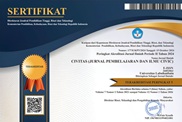IMPROVING STUDENTS' LEARNING MOTIVATION THROUGH LEARNING MODELSPROBLEM BASED LEARNING ADAPTIVE TECHNOLOGY BASED
Abstract
Student learning motivation is the initial step in the learning process that determines the direction of learning outcomes. Low learning motivation is a habit of conventional and monotonous teaching contexts that do not stimulate student involvement. The purpose of this study is to analyze the effectiveness of the implementation of the learning model.Problem Based Learning(PBL) based on adaptive technology in improving learning motivation of students in Class X-2 of SMA Negeri 3 Rantau Utara. The study used the Classroom Action Research (CAR) approach with the Kemmis and McTaggart spiral model which was implemented in two action cycles including the planning stage, action implementation, observation, and reflection. The subjects of the study were students in class X-2 at SMA Negeri 3 Rantau Utara with a total of 36 students. Data collection instruments were through observation, questionnaires and interviews. Data were analyzed using quantitative descriptive methods. The results of the study showed that learning innovation through Problem Based Learning (PBL) based on adaptive technology had a major impact on significantly improving students' learning motivation, as evidenced byAttention, Relevance, Confidence, as well as Satisfaction The results of the learning motivation indicator components from Keller showed a consistent and significant increase in the average value of student motivation in (Pre-cycle) amounting to 60.2 and (Cycle 1) the average value was 72.1 and (Cycle 2) the average value was 88.6. ModelProblem Based Learning Adaptive technology-based learning is very relevant for use in 21st century learning, especially in building and improving student learning motivation.
Full Text:
PDFReferences
A.M., S. (2018). Interaksi dan Motivasi Belajar Mengajar. Jakarta: Rajawali Pers.
AB Adi Satria, A. M. (2021). Inovasi pendidikan abad 21: penerapan design thinking dan pembelajaran berbasis proyek dalam pendidikan Indonesia. Jurnal Pendidikan Dasar.
Arif Bagas Adi Satria, A. M. (2021). Inovasi pendidikan abad 21: penerapan design thinkingdanpembelajaran berbasis proyek (projected based learning). JUrnal Pendidikan Dasar.
Arikunto Suharsimi, S. S. (2015). Penelitian Tindakan Kelas: Edisi Revisi. Jakarta: PT Bumi Aksara.
Keller, J. M. (2010). Motivational Design For Learning And Performance; The ARCS Model Approach. New York: Spinger.
Kemmis, S. &. (2014). The Action Research Planner: Doing Critical Participatory Action Research. Heidelberg New York: Springer Science & Business Media.
Nor Khakim, N. M. (2022). Penerapan Model Pembelajaran Problem Based Learning Dalam Meningkatkan Motivasi Belajar PPKN DI SMP YAKPI 1 DKI Jaya. Jurnal Citizenship Virtues, 347-358.
Rahmadani, T. (2020). Pengembangan Multimedia Interaktif Berbasis Model Problem Based Learning (PBL) Bagi Siswa Sekolah Dasar. Jurnal Basicedu, 938-946.
Roy Setiadi, A. M. (2023). Penerapan Model Problem Based Learning untuk Meningkatkan Motivasi Belajar Siswa pada Mata Pelajaran Pendidikan PKN. CIVICUS : Pendidikan-Penelitian-Pengabdian , 22-26.
Sartini, Halim, M., & Ramly. (2024). UPAYA MENINGKATKAN KEMAMPUAN BERPIKIR KREATIF DAN BERKOMUNIKASI SISWA MELALUI PENERAPAN MODEL PROBLEM BASED LEARNING PADA PEMBELAJARAN IPS DI KELAS V SD NEGERI 2 ANGGALOMOARE. Jurnal Wahana Kajian Pendidikan IPS, 8(2), 88–94. https://doi.org/10.33772/JWKP-IPS
Schunk, D. H. (2014). Motivation in Education: Theory, Research and Applications. Person.
Trilling, B. &. (2009). 21st century skills: Learning for life in our times. San Francisco: Jossy-Bass A Wiley Imprint.
Wasington, C. (2013). ). Using Adaptive Learning Technologies to Personalize Instruction to Student Interests. Jurnal of Educational Psychology, 105 (4), 932-945.
DOI: https://doi.org/10.36987/civitas.v11i2.7480
Refbacks
- There are currently no refbacks.

This work is licensed under a Creative Commons Attribution-ShareAlike 4.0 International License.
INDEXED BY :
Publisher:
LPPM Universitas Labuhanbatu
Editorial Address:
Jln.S.M. Raja No.126 A Aek Tapa Rantauprapat, Kab. Labuhanbatu Sumatera Utara, Indonesia

This work is licensed under a Attribution-NonCommercial 4.0 International (CC BY-NC 4.0)







.png)







